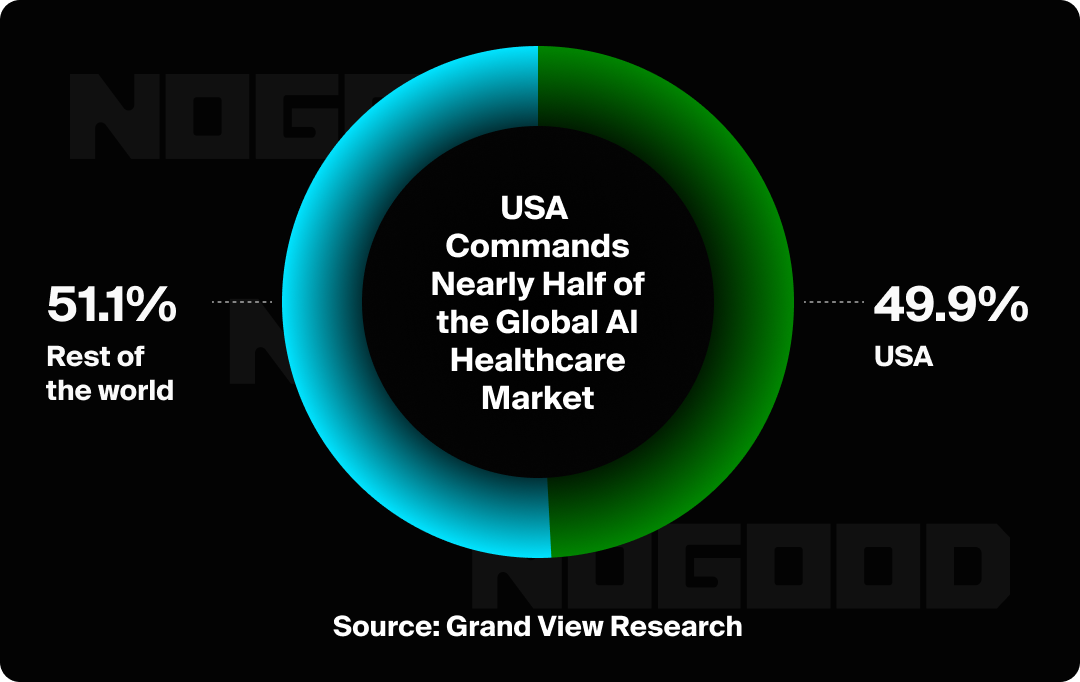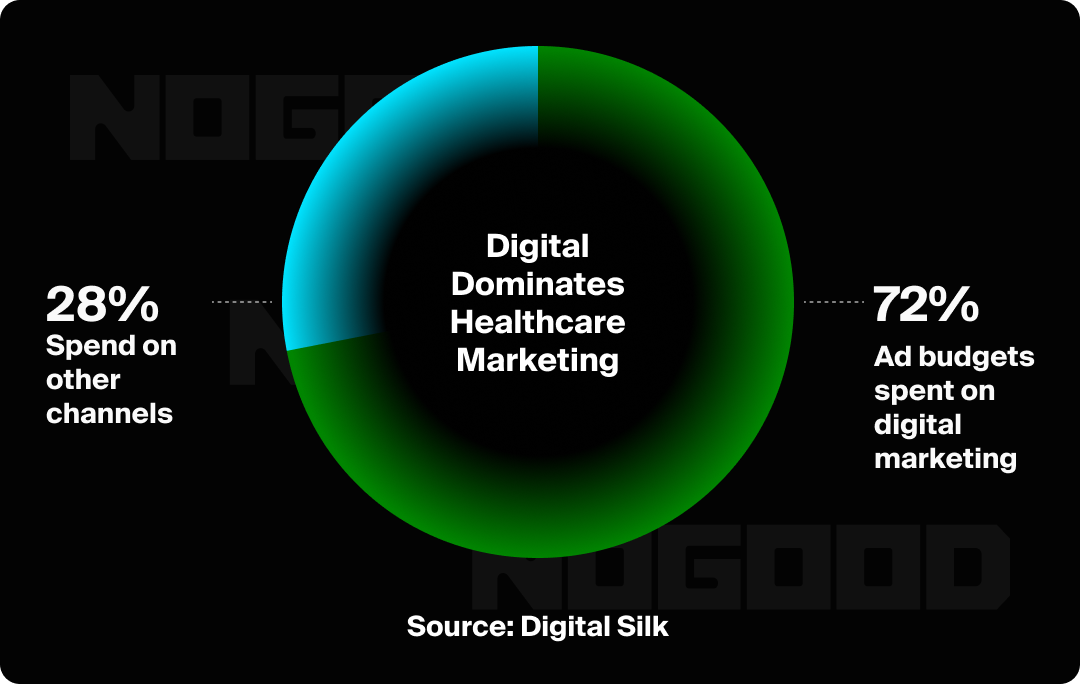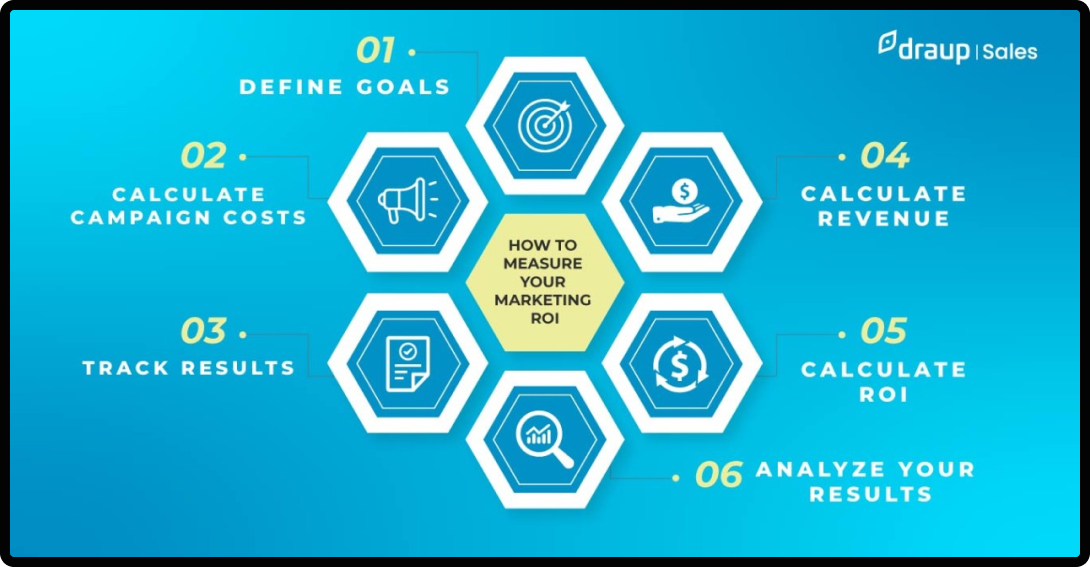Healthcare marketing in 2025 looks substantially different from five years ago, largely thanks to AI. The global AI healthcare market is projected to grow by 38.62% compounded annual growth rate between 2024 and 2030, as per a report by Grand View Research. Marketing leaders can no longer afford to view artificial intelligence as a future consideration; it’s a present-day reality for competitive survival.
For marketing executives in the healthcare industry, the real question is how quickly and effectively you can integrate AI into your marketing strategy.
This blog aims to answer pressing questions that are top of mind for every marketer, such as: what is the current state of AI in healthcare marketing, how to strategically use AI for marketing (plus some examples from the industry), and how to measure the performance and ROI of AI-based healthcare marketing.
Where AI in Healthcare Marketing Stands Today
Let the numbers tell this story:
- Approximately 94% of healthcare companies report using AI or machine learning, yet many are still scratching the surface of AI’s marketing potential.
- 92% of healthcare leaders believe Generative AI improves operational efficiency, while 65% see it as a tool for faster decision-making, as per a Deloitte report.
- In the U.S., the Artificial Intelligence in Healthcare market size was estimated at 13.26 billion USD in 2024, and is projected to grow at a CAGR of 36.76% from 2025 to 2033, as per a report by Grand View Research.
This growth will be driven by digital health infrastructure and investments in AI technology.

As the global healthcare and pharma advertising market nears $44.56 billion in 2025, competition for user attention and trust is intensifying, prompting marketers to allocate the largest share of their budgets to digital channels. A report by Digital Silk shows that 72.2% of industry ad spend is going to digital, and U.S. companies are prioritizing paid digital ads (12.5%), followed by social media (11.5%), and traditional media (9.5%).
So what does this mean for healthcare marketers?

Strategic AI Applications in Healthcare Marketing
1. Content Generation & AI Search Optimization
AI platforms like ChatGPT, Gemini, Perplexity, and GPT-powered search tools are rapidly emerging as alternative search platforms. AI agents are transforming how brands are discovered and chosen, as users increasingly rely on them for personalized recommendations, comparisons, and insights.
Optimization for AI Search
To stay visible in AI platforms, you need to understand how they answer different types of queries about your brand, such as:
- Branded queries (“is [your brand] good for healthcare solutions?”)
- Unbranded queries (“best healthcare marketing platforms”)
- Comparative queries (“[brand A] vs. [brand B]”)
Unlike traditional search engines that prioritize keywords and backlinks, AI agents pull insights from across the web, weighing user-generated content, third-party reviews, social mentions, and contextual relevance to form well-rounded answers.
In other words, your brand’s digital footprint must be credible, and consistently positioned. If people and platforms are talking about you, AI is listening; and learning. Investing in Digital PR and Answer Engine Optimization (AEO) is no longer optional. It’s your new visibility play.
Content Personalization at Scale
AI-powered content creation is reshaping how healthcare marketers engage audiences across a wide range of channels. It enables faster production, deeper personalization, and consistent messaging, making it a game-changer.
- Website & SEO: AI helps generate optimized blog posts, service pages, FAQs, and educational content customized to branded and unbranded healthcare queries, improving discoverability and authority.
- Email Marketing: AI enables personalized email sequences based on user behavior, lifecycle stage, or location, helping healthcare marketers build stronger connections with users, providers, or partners.
- Social Media: From LinkedIn thought leadership to Instagram carousels, AI can help build platform-specific content, repurpose assets, and optimize posts for engagement across audience segments.
- Paid Media & Ads: AI supports the creation of multiple ad variations quickly for a variety of ad platforms like Google Search to Meta Ads, allowing performance teams to test and refine messaging with greater speed and accuracy. It can also help improve the landing page content for higher relevance.
- Video & Scriptwriting: Script drafts for explainer videos, educational content, and webinars can be generated using AI, enabling faster production of complex, regulated messaging. Do note; there is a need for a human review for any regulatory implications.
- Sales Enablement: AI helps create case studies, sales decks, and follow-up emails that are customized to industries, specific decision-maker roles, or sales funnel stages, thereby improving the sales cycles and, in some places, shortening them.
2. Intelligent Chatbots & Virtual Assistants
Let’s face it: users today expect instant answers. That’s exactly where AI chatbots and virtual assistants shine. Digital assistants don’t just respond to FAQs; they capture leads, guide users through journeys, and keep your brand available 24/7. For marketers, this means smarter acquisition and better conversions. Here’s how intelligent chatbots are reshaping user engagement in healthcare marketing:
Instant User Interaction
AI chatbots act as your always-on front desk that welcomes visitors with a friendly, “How can I help you today?” and instantly handles common questions like clinic hours, service details, or doctor availability. These routine queries are resolved without any wait time significantly boosting the user experience and leaving a positive brand impression.
Need to book a flu shot? The chatbot can confirm availability and direct the user to a scheduling link, all in one seamless conversation. No forms or callbacks, just quick, convenient interaction that converts interest into action.
Personalized Guidance & Education
Modern chatbots do more than deliver generic responses. They use AI to understand context and personalize support. From symptom checkers that guide users toward appropriate care, to remembering user conditions (like diabetes), and sharing relevant health tips. The following are some applications:
- Symptom Assessment: Chatbots can conduct preliminary symptom assessments and guide users to the right care pathway (e.g., urgent care, telehealth, or self-care).
- Insurance Verification: AI assistants can check insurance eligibility and explain benefits in easy-to-understand language, reducing friction and drop-offs.
- Treatment Education: Chatbots can deliver procedure-specific content tailored to the user’s interest or condition, helping with improving health literacy.
For healthcare marketers, chatbots support user engagement and retention by naturally guiding users through personalized journeys, ultimately boosting retention rates through timely and relevant interactions.
Lead Nurturing & Identifying User Segments
AI chatbots are effective tools for segmenting users and guiding them towards their end goal. A cosmetic clinic’s bot, for example, might ask, “Are you exploring Procedure A or B?” and segment users based on interest.
High-intent leads can be tagged for follow-up or sent directly to booking, while general queries are handled instantly. Urgent questions get escalated to human staff, ensuring the right attention at the right time, all while collecting insights that inform future campaigns.
Case Study: OSF HealthCare’s “Clare”
OSF HealthCare launched Clare, a 24/7 virtual assistant that helps users check symptoms, find doctors, schedule visits, and access health resources. As part of their “digital front door” strategy, Clare helped generate $1.2 million in additional user revenue by capturing leads that would’ve otherwise slipped away after hours. Clare’s impact shows how intelligent automation can convert missed opportunities into millions in new revenue.
3. Predictive Analytics for User Journey Optimization
In marketing, success often hinges on timing, and that’s exactly where predictive analytics can be a game-changer. Powered by AI and machine learning, predictive analytics allows marketers to stop guessing and start forecasting. By analyzing historical and behavioral data, AI can uncover patterns that help teams anticipate user needs and service demand.
Forecasting Demand With Precision
Predictive models help healthcare marketers identify which services are likely to be in demand, and when. For example, if colorectal screenings typically spike in Q2 based on past data, marketers can launch targeted awareness campaigns weeks in advance, maximizing outreach during high-intent periods.
Proactive User Outreach
Instead of reacting to missed appointments or no-shows, marketers can use AI to predict who’s likely to drop out of care and re-engage them with reminders, follow-up content, or appointment nudges. The same applies to preventive screenings and recurring treatments. With predictive models, marketing becomes proactive, not reactive.
Next-Best Action Marketing
Advanced healthcare CRMs now use AI to recommend the next-best marketing action based on past outcomes. For instance, if a user recently underwent surgery, the system might trigger outreach promoting rehab or post-op care services. These insights help marketers prioritize where to focus (and what to promote) based on what’s likely to convert.
Case Study: Virtua Health
Virtua Health used CRM data and predictive AI to identify a user at high risk for breast cancer. After a few targeted email nudges, she finally booked a check-up, leading to a diagnosis, treatment, and surgery within weeks. That one well-timed campaign didn’t just drive engagement; it may have saved her life. This is predictive analytics at its best: smart, timely, and outcomes-driven.
4. Social Listening & Reputation Management
Reputation isn’t just PR; it’s users’ trust, and in the age of online reviews and social media, that trust can shift with a single bad experience. That’s why smart healthcare marketers are turning to AI-powered social listening and reputation tools to stay ahead of the narrative.
Sentiment Analysis
AI can scan thousands of reviews, comments, and ratings across platforms in seconds. Natural Language Processing (NLP) can break down sentiment (positive, neutral, or negative) and identify recurring issues like “long wait times” or “billing confusion.”
Instead of reacting late, you get actionable insights to fix real problems, fast. Advanced AI Search monitoring tools like Goodie can also help gauge the brand sentiment across LLMs, as LLMs primarily use the user-generated content across the web and summarize information intelligently.
Smarter & Faster Responses
AI tools can even suggest empathetic, on-brand responses to negative reviews or social comments. With human oversight, the team can respond within minutes, showing that you listen, care, and act. That kind of engagement builds real credibility.
Avoid PR Crises
Avoiding a crisis is difficult and not always possible. Is AI the perfect solution? Not yet, but it can help with predictions that can mitigate the impact of a crisis. If there’s a spike in complaints about a certain department or a particular service, your marketing team can take proactive steps before your brand takes a hit.
Turn Positive Sentiment Into Marketing Fuel
Last but not least, why let great feedback sit idle? AI helps identify your biggest advocates and happiest users. Use their stories in testimonials, campaigns, and social proof, backed by data; not guesses.
Measuring the Effectiveness of your AI Marketing efforts:
With the current AI buzz, implementing AI in healthcare marketing is exciting, but the real question every CMO or senior marketer asks is, “How do we know it’s working?”
We have curated some important metrics that matter to every business and should give the marketing team a fair idea of where the performance is headed.

1. Acquisition Cost (CAC)
This tells you how much you’re spending to bring in a new user. CAC is generally calculated as the total cost per user acquired.
Why It Matters: Lowering CAC means your marketing is more efficient.
2. Conversion Rates
This measures how many users take a desired action (like booking an appointment or signing up for a webinar) after seeing your content or ad.
Why It Matters: High conversion rates mean your marketing is persuasive and well-aligned with audience needs.
3. Engagement Metrics
Engagement metrics like Open rates, Clicks, and Time on site indicate how users interact with your content: are they opening emails, clicking links, or spending time on your website?
Why It Matters: Strong engagement signals higher content relevance and audience interest.
4. Customer Lifetime Value (CLV)
This metric estimates how much revenue a user will generate over their entire relationship with your organization.
Why It Matters: Users who stay longer and use more services are more valuable.
5. Operational Efficiency
Measures how much faster and smoother marketing workflows become (e.g., content generation, campaign launches, reporting).
Why It Matters: Less manual work = faster go-to-market, more room for creativity, and cost savings.
6. Staff Productivity
Tracks how much more your team can get done with AI.
Why It Matters: When AI handles repetitive tasks (copywriting, segmentation, A/B testing), your team can focus on strategy, creative thinking, and innovation.
7. User Satisfaction
Experience scores and reviews reflect how users perceive their interaction with your brand, often measured via surveys, online reviews, or Net Promoter Score (NPS).
Why It Matters: AI helps improve experience by enabling faster response times, relevant messaging, and consistent follow-up, leading to better reviews and stronger loyalty.
5 Ways to Harness AI in Healthcare Marketing
AI in healthcare marketing isn’t just about acquiring new users, it’s transforming the entire journey from Awareness > Engagement > Nurturing > Acquisition > Retention. AI helps you deliver timely, personalized experiences at every stage, 24/7.
- Optimize for AI Search & Digital Discovery: Answer engines and AI-powered platforms are becoming the new front door. Invest in Answer Engine Optimization (AEO) to own the brand narrative across answer engines.
- Content Creation & Personalization at scale: Create blog posts, ad copy, social assets, and more in less time, with more relevance. Targeting user segments across funnel stages is now possible.
- Drive Engagement: Intelligent Chatbots can handle FAQs to appointment bookings, they ensure real-time, contextual support that improves user experience and captures high-intent leads around the clock.
- Use Predictive Analytics to Retain and Nurture: Predictive analytics helps stay proactive, reduce drop-offs, and increase lifetime value. Predictive AI can help you anticipate what users need before they ask, whether it’s a follow-up on a missed screening or a nudge toward a wellness check.
- Protect Brand Trust: Regularly monitor user-generated content to catch brand-damaging conversations early and respond with empathy, and clarity.
The future of healthcare marketing will favor those who embrace change fast and adapt faster.

![Cover image for the blogpost: "Top 10 Answer Engine Optimization (AEO) Tools in 2025 [Ranked]"](https://nogood.io/wp-content/uploads/2025/05/NG_0414_TopAEOToolsToBoostYourAISearchVisibility_Cover_1600x800-700x350.png)




